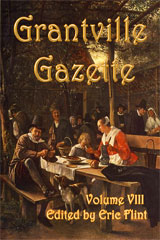
And here we go—on time, just as promised. Grantville Gazette Volume 8 is ready for our discerning readers.
Just what is going on in Europe these days of 1632 – 1635 or thereabouts?
Did you ever wonder where some of the old pick-up lines came from? Iver P. Cooper gives us a possible answer for one of them in "The Painter's Gambit." Tsk, tsk. Artists and their etchings . . .
Industrial magnate Louis De Geer finally gives in to curiosity and comes to visit in Kim Mackey's "Essen Steel Chronicles, Part 2." Of course, he does have his own motives. Not that Josh and Colette don't have theirs, for that matter.
Terry Howard's cracker barrel philosopher, Jimmy Dick Shaver, is at it again in "Not a Princess Bride," and you do have to wonder "who was that up-timer" after you read Barry C. Swift's "Got My Buck."
Virginia DeMarce shows us just how complicated things could be in "Prince and Abbot." Fulda will never be the same after that election. Anette Pedersen addresses "A Question of Faith." Has Father Johannes struggled with his conscience for long enough? That's a question only he can answer.
Richard Evans gives us a slightly darker view of things in "Capacity for Harm," but Russ Rittgers' Chad Jenkins accomplishes a parent's perfect revenge in "Three Innocuous Words."
The rest of the world isn't sleeping during all the changes that are taking place in Germany. Gorg Huff and I figure that something must be going on in Russia, so we told you about it in "Butterflies in the Kremlin," part one of a series. As well, a repressed sect of Christianity finds a new home in Jay Robison's "The Sons of St. John."
Faith in God comes in many flavors. Douglas W. Jones gives us another view of it in "Joseph Hanauer: Into the Very Pit of Hell."
Karen Bergstralh's new-made master blacksmith continues to build his business in "Rolling On," while Dr. Phil falls in love—wonder of wonders, not with himself—in Kerryn Offord's "Dr. Phil's Distraction." And Chris Racciato proves that there's not a new con game under the sun with "Dear Sir."
Our non-fiction in this volume covers a lot of territory, as usual. From "New France in 1634 and the Fate of North America" by Michael Varhola, to the real reason air conditioning was developed in Mark Huston's "Refrigeration and the 1632 World: Opportunities and Challenges." Last, but certainly not least, considering the reception from the Barflies, Iver P. Cooper gives us the rundown on the magic metal aluminum in "Aluminum: Will 'O the Wisp."
Fire up the coffee pot, stock up on the chocolate and settle in for a nice, long read. We hope you'll enjoy our latest offerings.
Paula Goodlett
June, 2006